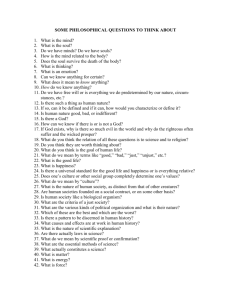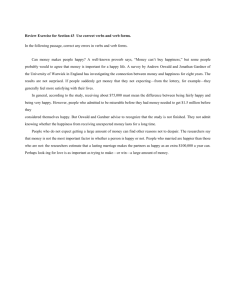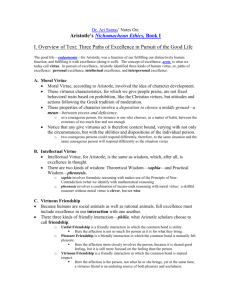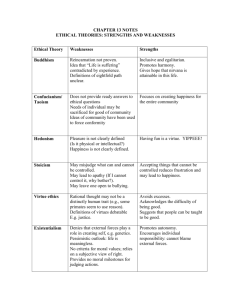Aristotle: "The Aim of Man"
advertisement
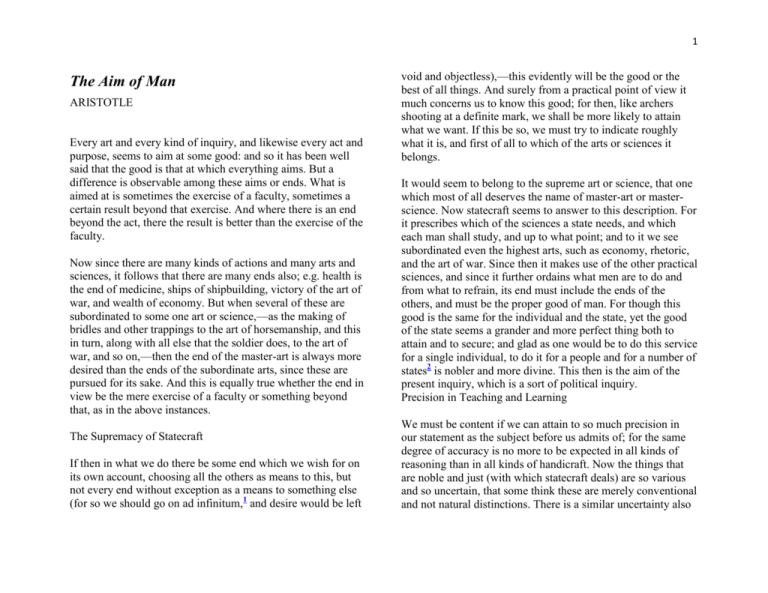
1 The Aim of Man ARISTOTLE Every art and every kind of inquiry, and likewise every act and purpose, seems to aim at some good: and so it has been well said that the good is that at which everything aims. But a difference is observable among these aims or ends. What is aimed at is sometimes the exercise of a faculty, sometimes a certain result beyond that exercise. And where there is an end beyond the act, there the result is better than the exercise of the faculty. Now since there are many kinds of actions and many arts and sciences, it follows that there are many ends also; e.g. health is the end of medicine, ships of shipbuilding, victory of the art of war, and wealth of economy. But when several of these are subordinated to some one art or science,—as the making of bridles and other trappings to the art of horsemanship, and this in turn, along with all else that the soldier does, to the art of war, and so on,—then the end of the master-art is always more desired than the ends of the subordinate arts, since these are pursued for its sake. And this is equally true whether the end in view be the mere exercise of a faculty or something beyond that, as in the above instances. The Supremacy of Statecraft If then in what we do there be some end which we wish for on its own account, choosing all the others as means to this, but not every end without exception as a means to something else (for so we should go on ad infinitum,1 and desire would be left void and objectless),—this evidently will be the good or the best of all things. And surely from a practical point of view it much concerns us to know this good; for then, like archers shooting at a definite mark, we shall be more likely to attain what we want. If this be so, we must try to indicate roughly what it is, and first of all to which of the arts or sciences it belongs. It would seem to belong to the supreme art or science, that one which most of all deserves the name of master-art or masterscience. Now statecraft seems to answer to this description. For it prescribes which of the sciences a state needs, and which each man shall study, and up to what point; and to it we see subordinated even the highest arts, such as economy, rhetoric, and the art of war. Since then it makes use of the other practical sciences, and since it further ordains what men are to do and from what to refrain, its end must include the ends of the others, and must be the proper good of man. For though this good is the same for the individual and the state, yet the good of the state seems a grander and more perfect thing both to attain and to secure; and glad as one would be to do this service for a single individual, to do it for a people and for a number of states2 is nobler and more divine. This then is the aim of the present inquiry, which is a sort of political inquiry. Precision in Teaching and Learning We must be content if we can attain to so much precision in our statement as the subject before us admits of; for the same degree of accuracy is no more to be expected in all kinds of reasoning than in all kinds of handicraft. Now the things that are noble and just (with which statecraft deals) are so various and so uncertain, that some think these are merely conventional and not natural distinctions. There is a similar uncertainty also 2 about what is good, because good things often do people harm: men have before now been ruined by wealth, and have lost their lives through courage. Our subject, then, and our data being of this nature, we must be content if we can indicate the truth roughly and in outline, and if, in dealing with matters that are not amenable to immutable laws, and reasoning from premises that are but probable, we can arrive at probable conclusions. The reader, on his part, should take each of my statements in the same spirit; for it is the mark of an educated man to require, in each kind of inquiry, just so much exactness as the subject admits of: it is equally absurd to accept probable reasoning from a mathematician, and to demand scientific proof from an orator. But each man can form a judgment about what he knows, and is called “a good judge” of that—of any special matter when he has received a special education therein, “a good judge” (without any qualifying epithet) when he has received a universal education. And hence a young man is not qualified to be a student of statecraft; for he lacks experience of the affairs of life, which form the data and the subject-matter of statecraft. Further, since he is apt to be swayed by his feelings, he will derive no benefit from a study whose aim is not speculative but practical. But in this respect young in character counts the same as young in years; for the young man’s disqualification is not a matter of time, but is due to the fact that feeling rules his life and directs all his desires. Men of this character turn the knowledge they get to no account in practice, as we see with those we call incontinent;3 but those who direct their desires and actions by reason will gain much profit from the knowledge of these matters. 7 So much then by way of preface as to the student, and the spirit in which he must accept what we say, and the object which we propose to ourselves. The Good is Happiness Since—to resume—all knowledge and all purpose aims at some good, what is this which we say is the aim of statecraft; or, in other words, what is the highest of all realizable goods? As to its name, I suppose nearly all men are agreed; for the masses and the men of culture alike declare that it is happiness, and hold that to “live well” or to “do well” is the same as to be “happy.” But they differ as to what this happiness is, and the masses do not give the same account of it as the philosophers. The former take it to be something palpable and plain, as pleasure or wealth or fame; one man holds it to be this, and another that, and often the same man is of different minds at different times,—after sickness it is health, and in poverty it is wealth; while when they are impressed with the consciousness of their ignorance, they admire most those who say grand things that are above their comprehension. Some philosophers, on the other hand, have thought that, beside these several good things, there is an “absolute” good which is the cause of their goodness. As it would hardly be worthwhile to review all the opinions that have been held, we will confine ourselves to those which are most popular, or which seem to have some foundation in reason. But we must not omit to notice the distinction that is drawn between the method of proceeding from your starting-points or principles,4 and the method of working up to them. Plato used with fitness to raise this question, and to ask whether the right way is from or to your starting-points, as in the race-course you 3 may run from the judges to the boundary, or vice versa. Well, we must start from what is known. But “what is known” may mean two things: “what is known to us,” which is one thing, or “what is known” simply, which is another. I think it is safe to say that we must start from what is known to us. And on this account nothing but a good moral training can qualify a man to study what is noble and just—in a word, to study questions of Statecraft. For the undemonstrated fact is here the startingpoint, and if this undemonstrated fact be sufficiently evident to a man, he will not require a “reason why.” Now the man who has had a good moral training either has already arrived at starting-points or principles of action, or will easily accept them when pointed out. But he who neither has them nor will accept them may hear what Hesiod5 says — “The best is he who of himself doth know; Good too is he who listens to the wise; But he who neither knows himself nor heeds The words of others, is a useless man.” Conflicting Views of What Happiness Is Let us now take up the discussion at the point from which we digressed. It seems that men not unreasonably take their notions of the good or happiness from the lives actually led, and that the masses who are the least refined suppose it to be pleasure, which is the reason why they aim at nothing higher than the life of enjoyment. For the most conspicuous kinds of life are three: this life of enjoyment, the life of the statesman, and, thirdly, the contemplative life. The mass of men show themselves utterly slavish in their preference for the life of brute beasts, but their views receive consideration because many of those in high places have the tastes of Sardanapalus.6 Men of refinement with a practical turn prefer honor; for I suppose we may say that honor is the aim of the statesman’s life. But this seems too superficial to be the good we are seeking: for it appears to depend upon those who give rather than upon those who receive it; while we have a presentiment that the good is something that is peculiarly a man’s own and can scarce be taken away from him. Moreover, these men seem to pursue honor in order that they may be assured of their own excellence,—at least, they wish to be honored by men of sense, and by those who know them, and on the ground of their virtue or excellence. It is plain, then, that in their view, at any rate, virtue or excellence is better than honor; and perhaps we should take this to be the end of the statesman’s life, rather than honor. But virtue or excellence also appears too incomplete to be what we want; for it seems that a man might have virtue and yet be asleep or be inactive all his life, and, moreover, might meet with the greatest disasters and misfortunes; and no one would maintain that such a man is happy, except for argument’s sake. But we will not dwell on these matters now, for they are sufficiently discussed in the popular treatises. The third kind of life is the life of contemplation: we will treat of it further on. As for the money-making life, it is something quite contrary to nature; and wealth evidently is not the good of which we are in search, for it is merely useful as a means to something else. So we might rather take pleasure and virtue or excellence to be ends than wealth; for they are chosen on their own account. But 4 it seems that not even they are the end, though much breath has been wasted in attempts to show that they are. Happiness as Man’s Highest Good Leaving these matters, then, let us return once more to the question, what this good can be of which we are in search. It seems to be different in different kinds of action and in different arts,—one thing in medicine and another in war, and so on. What then is the good in each of these cases? Surely that for the sake of which all else is done. And that in medicine is health, in war is victory, in building is a house,—a different thing in each different case, but always, in whatever we do and in whatever we choose, the end. For it is always for the sake of the end that all else is done. If then there be one end of all that man does, this end will be the realizable good,—or these ends, if there be more than one. By this generalization our argument is brought to the same point as before. This point we must try to explain more clearly. We see that there are many ends. But some of these are chosen only as means, as wealth, flutes, and the whole class of instruments. And so it is plain that not all ends are final.7 But the best of all things must, we conceive, be something final. If then there be only one final end, this will be what we are seeking,—or if there be more than one, then the most final of them. Now that which is pursued as an end in itself is more final than that which is pursued as means to something else, and that which is never chosen as means than that which is chosen both as an end in itself and as means, and that is strictly final which is always chosen as an end in itself and never as means. Happiness seems more than anything else to answer to this description: for we always choose it for itself, and never for the sake of something else; while honor and pleasure and reason, and all virtue or excellence, we choose partly indeed for themselves (for, apart from any result, we should choose each of them), but partly also for the sake of happiness, supposing that they will help to make us happy. But no one chooses happiness for the sake of these things, or as a means to anything else at all. We seem to be led to the same conclusion when we start from the notion of self-sufficiency. The final good is thought to be self-sufficing. In applying this term we do not regard a man as an individual leading a solitary life, but we also take account of parents, children, wife, and, in short, friends and fellowcitizens generally, since man is naturally a social being. Some limit must indeed be set to this; for if you go on to parents and descendants and friends of friends, you will never come to a stop. But this we will consider further on: for the present we will take self-sufficing to mean what by itself makes life desirable and in want of nothing. And happiness is believed to answer to this description. And further, happiness is believed to be the most desirable thing in the world, and that not merely as one among other good things: if it were merely one among other good things,8 it is plain that the addition of the least of other goods must make it more desirable; for the addition becomes a surplus of good, and of two goods the greater is always more desirable. Thus it seems that happiness is something final and self-sufficing, and is the end of all that man does. But perhaps the reader thinks that though no one will dispute the statement that happiness is the best thing in the world, yet a still more precise definition of it is needed. This will best be gained, I think, by asking, What is the function of man? For as 5 the goodness and the excellence of a piper or a sculptor, or the practiser of any art, and generally of those who have any function or business to do, lies in that function, so man’s good would seem to lie in his function, if he has one. But can we suppose that, while a carpenter and a cobbler has a function and a business of his own, man has no business and no function assigned him by nature? Nay, surely as his several members, eye and hand and foot, plainly have each his own function, so we must suppose that man also has some function over and above all these. What then is it? Life evidently he has in common even with the plants, but we want that which is peculiar to him. We must exclude, therefore, the life of mere nutrition and growth. Next to this comes the life of sense; but this too he plainly shares with horses and cattle and all kinds of animals. There remains then the life whereby he acts—the life of his rational nature, with its two sides or divisions, one rational as obeying reason, the other rational as having and exercising reason. But as this expression is ambiguous, we must be understood to mean thereby the life that consists in the exercise of the faculties; for this seems to be more properly entitled to the name. The function of man, then, is exercise of his vital faculties9 on one side in obedience to reason, and on the other side with reason. But what is called the function of a man of any profession and the function of a man who is good in that profession are generically the same, e.g. of a harper and of a good harper; and this holds in all cases without exception, only that in the case of the latter his superior excellence at his work is added; for we say a harper’s function is to harp, and a good harper’s to harp well. Man’s function then being, as we say, a kind of life—that is to say, exercise of his faculties and action of various kinds with reason—the good man’s function is to do this well and nobly. But the function of anything is done well when it is done in accordance with the proper excellence of that thing. If this be so the result is that the good of man is exercise of his faculties in accordance with excellence or virtue, or, if there be more than one, in accordance with the best and most complete virtue.10 But there must also be a full term of years for this exercise; for one swallow or one fine day does not make a spring, nor does one day or any small space of time make a blessed or happy man. This, then, may be taken as a rough outline of the good; for this, I think, is the proper method,—first to sketch the outline, and then to fill in the details. But it would seem that, the outline once fairly drawn, anyone can carry on the work and fit in the several items which time reveals to us or helps us to find. And this indeed is the way in which the arts and sciences have grown; for it requires no extraordinary genius to fill up the gaps. We must bear in mind, however, what was said above, and not demand the same degree of accuracy in all branches of study, but in each case so much as the subject-matter admits of and as is proper to that kind of inquiry. The carpenter and the geometer both look for the right angle, but in different ways: the former only wants such an approximation to it as his work requires, but the latter wants to know what constitutes a right angle, or what is its special quality; his aim is to find out the truth. And so in other cases we must follow the same course, lest we spend more time on what is immaterial than on the real business in hand. Nor must we in all cases alike demand the reason why; sometimes it is enough if the undemonstrated fact be fairly pointed out, as in the case of the starting-points or principles of a science. Undemonstrated facts always form the 6 first step or starting-point of a science; and these starting-points or principles are arrived at some in one way, some in another— some by induction,11 others by perception, others again by some kind of training. But in each case we must try to apprehend them in the proper way, and do our best to define them clearly; for they have great influence upon the subsequent course of an inquiry. A good start is more than half the race, I think, and our starting-point or principle, once found, clears up a number of our difficulties. Confirmation by Current Views We must not be satisfied, then, with examining this startingpoint or principle of ours as a conclusion from our data, but must also view it in its relation to current opinions on the subject; for all experience harmonizes with a true principle, but a false one is soon found to be incompatible with the facts. Now, good things have been divided into three classes, external goods on the one hand, and on the other goods of the soul and goods of the body; and the goods of the soul are commonly said to be goods in the fullest sense, and more good than any other. But “actions and exercises of the vital faculties or soul” may be said to be “of the soul.” So our account is confirmed by this opinion, which is both of long standing and approved by all who busy themselves with philosophy.… First, then, the view that happiness is excellence or a kind of excellence harmonizes with our account; for “exercise of faculties in accordance with excellence” belongs to excellence. But I think we may say that it makes no small difference whether the good be conceived as the mere possession of something, or as its use—as a mere habit or trained faculty, or as the exercise of that faculty. For the habit or faculty may be present, and yet issue in no good result, as when a man is asleep, or in any other way hindered from his function; but with its exercise this is not possible, for it must show itself in acts and in good acts. And as at the Olympic games it is not the fairest and strongest who receive the crown, but those who contend (for among these are the victors), so in life, too, the winners are those who not only have all the excellences, but manifest these in deed. And, further, the life of these men is in itself pleasant. For pleasure is an affection of the soul, and each man takes pleasure in that which he is said to love,—he who loves horses in horses, he who loves sight-seeing in sight-seeing, and in the same way he who loves justice in acts of justice, and generally the lover of excellence or virtue in virtuous acts or the manifestation of excellence. And while with most men there is a perpetual conflict between the several things in which they find pleasure, since these are not naturally pleasant, those who love what is noble take pleasure in that which is naturally pleasant. For the manifestations of excellence are naturally pleasant, so that they are both pleasant to them and pleasant in themselves. Their life, then, does not need pleasure to be added to it as an appendage, but contains pleasure in itself. Indeed, in addition to what we have said, a man is not good at all unless he takes pleasure in noble deeds. No one would call a man just who did not take pleasure in doing justice, nor generous who took no pleasure in acts of generosity, and so on. If this be so, the manifestations of excellence will be pleasant in themselves. But they are also both good and noble, and that in the highest degree—at least, if the good man’s judgment about them is right, for this is his judgment. Happiness, then, is at once the best and noblest and pleasantest thing in the world, and these 7 are not separated, as the Delian inscription12 would have them to be: — “What is most just is noblest, health is best, Pleasantest is to get your heart’s desire.” For all these characteristics are united in the best exercises of our faculties; and these, or some one of them that is better than all the others, we identify with happiness. But nevertheless happiness plainly requires external goods too, as we said; for it is impossible, or at least not easy, to act nobly without some furniture of fortune. There are many things that can only be done through instruments, so to speak, such as friends and wealth and political influence: and there are some things whose absence takes the bloom off our happiness, as good birth, the blessing of children, personal beauty; for a man is not very likely to be happy if he is very ugly in person, or of low birth, or alone in the world, or childless, and perhaps still less if he has worthless children or friends, or has lost good ones that he had. As we said, then, happiness seems to stand in need of this kind of prosperity; and so some identify it with good fortune, just as others identify it with excellence. anything else, in proportion as it is better than all other human things. This belongs more properly to another branch of inquiry; but we may say that even if it is not heavensent, but comes as a consequence of virtue or some kind of learning or training, still it seems to be one of the most divine things in the world; for the prize and aim of virtue would appear to be better than anything else and something divine and blessed. Again, if it is thus acquired it will be widely accessible; for it will then be in the power of all except those who have lost the capacity for excellence to acquire it by study and diligence. And if it be better that men should attain happiness in this way rather than by chance, it is reasonable to suppose that it is so, since in the sphere of nature all things are arranged in the best possible way, and likewise in the sphere of art, and of each mode of causation, and most of all in the sphere of the noblest mode of causation. And indeed it would be too absurd to leave what is noblest and fairest to the dispensation of chance. How Happiness Is Attained But our definition itself clears up the difficulty; for happiness was defined as a certain kind of exercise of the vital faculties in accordance with excellence or virtue. And of the remaining goods,13 some must be present as necessary conditions, while others are aids and useful instruments to happiness. And this agrees with what we said at starting. We then laid down that the end of the art political is the best of all ends; but the chief business of that art is to make the citizens of a certain character—that is, good and apt to do what is noble. This has led people to ask whether happiness is attained by learning, or the formation of habits, or any other kind of training, or comes by some divine dispensation or even by chance. Well, if the Gods do give gifts to men, happiness is likely to be among the number, more likely, indeed, than It is not without reason, then, that we do not call an ox, or a horse, or any brute happy; for none of them is able to share in this kind of activity. For the same reason also a child is not happy; he is as yet, because of his age, unable to do such things. If we ever call a child happy, it is because we hope he 8 will do them. For, as we said, happiness requires not only perfect excellence or virtue, but also a full term of years for its exercise. For our circumstances are liable to many changes and to all sorts of chances, and it is possible that he who is now most prosperous will in his old age meet with great disasters, as is told of Priam14 in the tales of Troy; and a man who is thus used by fortune and comes to a miserable end cannot be called happy. Can Man Be Happy During Life? Are we, then, to call no man happy as long as he lives, but to wait for the end, as Solon15 said? And, supposing we have to allow this, do we mean that he actually is happy after he is dead? Surely that is absurd, especially for us who say that happiness is a kind of activity or life. But if we do not call the dead man happy, and if Solon meant not this, but that only then could we safely apply the term to a man, as being now beyond the reach of evil and calamity, then here too we find some ground for objection. For it is thought that both good and evil may in some sort befall a dead man (just as they may befall a living man, although he is unconscious of them), e.g. honors rendered to him, or the reverse of these, and again the prosperity or the misfortune of his children and all his descendants. But this, too, has its difficulties; for after a man has lived happily to a good old age, and ended as he lived, it is possible that many changes may befall him in the persons of his descendants, and that some of them may turn out good and meet with the good fortune they deserve, and others the reverse. It is evident too that the degree in which the descendants are related to their ancestors may vary to any extent. And it would be a strange thing if the dead man were to change with these changes and become happy and miserable by turns. But it would also be strange to suppose that the dead are not affected at all, even for a limited time, by the fortunes of their posterity. But let us return to our former question;16 for its solution will, perhaps, clear up this other difficulty. The saying of Solon may mean that we ought to look for the end and then call a man happy, not because he now is, but because he once was happy. But surely it is strange that when he is happy we should refuse to say what is true of him, because we do not like to apply the term to living men in view of the changes to which they are liable, and because we hold happiness to be something that endures and is little liable to change, while the fortunes of one and the same man often undergo many revolutions: for, it is argued, it is plain that, if we follow the changes of fortune, we shall call the same man happy and miserable many times over, making the happy man “a sort of chameleon and one who rests on no sound foundation.” We reply that it cannot be right thus to follow fortune. For it is not in this that our weal or woe lies; but, as we said, though good fortune is needed to complete man’s life, yet it is the excellent employment of his powers that constitutes his happiness, as the reverse of this constitutes his misery. But the discussion of this difficulty leads to a further confirmation of our account. For nothing human is so constant as the excellent exercise of our faculties. The sciences themselves seem to be less abiding. And the highest of these exercises17 are the most abiding, because the happy are occupied with them most of all and most continuously (for this seems to be the reason why we do not forget how to do them18). The happy man, then, as we define him, will have this required property of permanence, and all through life will 9 preserve his character; for he will be occupied continually, or with the least possible interruption, in excellent deeds and excellent speculations; and, whatever his fortune be, he will take it in the noblest fashion, and bear himself always and in all things suitably, since he is truly good and “foursquare without a flaw.”19 But the dispensations of fortune are many, some great, some small. The small ones, whether good or evil, plainly are of no weight in the scale; but the great ones, when numerous, will make life happier if they be good; for they help to give a grace to life themselves, and their use is noble and good; but, if they be evil, will enfeeble and spoil happiness; for they bring pain, and often impede the exercise of our faculties. But nevertheless true worth shines out even here, in the calm endurance of many great misfortunes, not through insensibility, but through nobility and greatness of soul. And if it is what a man does that determines the character of his life, as we said, then no happy man will become miserable; for he will never do what is hateful and base. For we hold that the man who is truly good and wise will bear with dignity whatever fortune sends, and will always make the best of his circumstances, as a good general will turn the forces at his command to the best account, and a good shoemaker will make the best shoe that can be made out of a given piece of leather, and so on with all other crafts. If this be so, the happy man will never become miserable, though he will not be truly happy if he meets with the fate of Priam. But yet he is not unstable and lightly changed: he will not be moved from his happiness easily, nor by any ordinary misfortunes, but only by many heavy ones; and after such, he will not recover his happiness again in a short time, but if at all, only in a considerable period, which has a certain completeness, and in which he attains to great and noble things. We shall meet all objections, then, if we say that a happy man is “one who exercises his faculties in accordance with perfect excellence, being duly furnished with external goods, not for any chance time, but for a full term of years:” to which perhaps we should add, “and who shall continue to live so, and shall die as he lived,” since the future is veiled to us, but happiness we take to be the end and in all ways perfectly final or complete. If this be so, we may say that those living men are blessed or perfectly happy who both have and shall continue to have these characteristics, but happy as men only. The Division of Man’s Excellence Since happiness is an exercise of the vital faculties in accordance with perfect virtue or excellence, we will now inquire about virtue or excellence; for this will probably help us in our inquiry about happiness. And indeed the true statesman seems to be especially concerned with virtue, for he wishes to make the citizens good and obedient to the laws. Of this we have an example in the Cretan and the Lacedæmonian lawgivers,20 and any others who have resembled them. But if the inquiry belongs to statecraft or the science of the state, it is plain that it will be in accordance with our original purpose to pursue it. The virtue or excellence that we are to consider is, of course, the excellence of man; for it is the good of man and the happiness of man that we started to seek. And by the excellence of man I mean excellence not of body, but of soul; 10 for happiness we take to be an activity of the soul. If this be so, then it is evident that the statesman must have some knowledge of the soul, just as the man who is to heal the eye or the whole body must have some knowledge of them, and that the more in proportion as the science of the state is higher and better than medicine. But all educated physicians take much pains to know about the body. As statesmen, then, we must inquire into the nature of the soul, but in so doing we must keep our special purpose in view and go only so far as that requires; for to go into minuter detail would be too laborious for the present undertaking. Now, there are certain doctrines about the soul which are stated elsewhere with sufficient precision, and these we will adopt. Two parts of the soul are distinguished, an irrational and a rational part. Whether these are separated as are the parts of the body or any divisible thing, or whether they are only distinguishable in thought but in fact inseparable, like concave and convex in the circumference of a circle, makes no difference for our present purpose. Of the irrational part, again, one division seems to be common to all things that live, and to be possessed by plants—I mean that which causes nutrition and growth; for we must assume that all things that take nourishment have a faculty of this kind, even when they are embryos, and have the same faculty when they are full grown; at least, this is more reasonable than to suppose that they then have a different one. The excellence of this faculty, then, is plainly one that man shares with other beings, and not specifically human. And this is confirmed by the fact that in sleep this part of the soul, or this faculty, is thought to be most active, while the good and the bad man are undistinguishable when they are asleep (whence the saying that for half their lives there is no difference between the happy and the miserable; which indeed is what we should expect; for sleep is the cessation of the soul from those functions in respect of which it is called good or bad), except that they are to some slight extent roused by what goes on in their bodies, with the result that the dreams of the good man are better than those of ordinary people. However, we need not pursue this further, and may dismiss the nutritive principle, since it has no place in the excellence of man. But there seems to be another vital principle that is irrational, and yet in some way partakes of reason. In the case of the continent and of the incontinent man alike we praise the reason or the rational part, for it exhorts them rightly and urges them to do what is best; but there is plainly present in them another principle besides the rational one, which fights and struggles against the reason. For just as a paralyzed limb, when you will to move it to the right, moves on the contrary to the left, so is it with the soul; the incontinent man’s impulses run counter to his reason. Only whereas we see the refractory member in the case of the body, we do not see it in the case of the soul. But we must nevertheless, I think, hold that in the soul too there is something beside the reason, which opposes and runs counter to it (though in what sense it is distinct from the reason does not matter here). It seems, however, to partake of reason also, as we said: at least, in the continent man it submits to the reason; while in the temperate and courageous man we may say it is still more obedient; for in him it is altogether in harmony with the reason. The irrational part, then, it appears, is twofold. There is the vegetative faculty, which has no share of reason; and the faculty of appetite or of desire in general, which in a manner 11 partakes of reason or is rational as listening to reason and submitting to its sway,—rational in the sense in which we speak of rational obedience to father or friends, not in the sense in which we speak of rational apprehension of mathematical truths. But all advice and all rebuke and exhortation testify that the irrational part is in some way amenable to reason. If then we like to say that this part, too, has a share of reason, the rational part also will have two divisions: one rational in the strict sense as possessing reason in itself, the other rational as listening to reason as a man listens to his father. Now, on this division of the faculties is based the division of excellence; for we speak of intellectual excellences and of moral excellences; wisdom and understanding and prudence we call intellectual, liberality and temperance we call moral virtues or excellences. When we are speaking of a man’s moral character we do not say that he is wise or intelligent, but that he is gentle or temperate. But we praise the wise man, too, for his habit of mind or trained faculty; and a habit or trained faculty that is praiseworthy is what we call an excellence or virtue.




